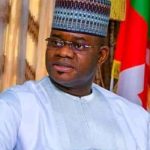The youngest realistic candidate in the presidential race, PRP’s Kola Abiola is 60 years old, followed by the presidential aspirant for the Labour Party. Peter Obi 61, Kwankwaso is 66, Tinubu is 70, and Atiku is 76. The incumbent President, of course, is 80.
The average age of retirement in most parts of the continent is 60 years. yet, in all of west Africa, Uganda, Sao Tome and Principe, Zimbabwe, and South Africa; the average age for heads of States is seventy-five years old; which is fifteen years above the average retirement age in most countries.
What is the implication of this for continental or national development?
Closer to home, the picture is just as bad.
For example, the Minister of Health is 77, the Minister of Information is 70, and the Minister of Education is 68.
Nigeria, ironically, has the world’s third youngest population,this means a third of our population is about 25 years old or younger.
Despite this, none of the people who have ruled Nigeria to date were born post-independence. Next year’s presidential election pits septuagenarians as the main challengers from the two major parties.
What are the implications of this for national development?
With the outset of the 4th republic, and since then, it has become a norm in our system of governance that a very large number of all the strategic political and administrative positions are occupied by senior citizens.
The history of independent Nigeria produced a series of young dictators.
General Yakubu Gowon was 31 years old when he became head of state in 1966. Subsequent military rulers, such as Murtala Muhammed and Olusegun Obasanjo, had not yet reached the age of 40 when they took power.
Today, in a democratically constituted Nigeria, we look in vain for young people to help shape the political destiny of their country.
For almost two decades, Nigeria has been ruled by a political caste that is characterised above all by elite continuity.
Muhammadu Buhari, the country’s current president, exemplifies this.
Having already held the reins of government as head of a military junta from 1983 to 1985; his current 44-member cabinet, which had an average age of 61 in March 2021, includes many ministers who previously held high political office in prior legislative periods, or under the military dictator Sani Abacha in the 1990s.
Representation of Nigerian youth is no better in Parliament either.
The average age in the House of Representatives was 55.7 when MPs were sworn in in 2019. And the Senate, for which no data is available but where many ex-governors and ex-ministers traditionally sit, is popularly mocked as the retirement home of aging elites.
Only under great pressure from civil society, and following a two-year campaign called “Not Too Young To Run”, were youth organisations able to convince the national assembly and the president to reform the constitution in 2018. This constitutional reform came into force before the last presidential and parliamentary elections in 2019.
Today, anyone who is at least 25 years old can run for a seat in the House of Representatives and in a regional parliament. The minimum age for a presidential candidacy has been reduced from 40 to 35. However, the minimum age has not been changed for the Senate or for gubernatorial elections.
The legal barriers that exclude young people from political office in Nigeria are, first and foremost, an expression of the seniority principle, which is still deeply rooted across all ethnicities and religions in Nigeria.
According to this principle, only older people are considered to have the necessary level of knowledge and experience for making important political decisions.
Young people, on the other hand, are assumed to be too immature and inexperienced to participate responsibly in political decision-making processes.
The enforcement of the seniority principle in Nigeria goes far beyond these stereotypes. Already in the family, then at school, and later at university, young people are raised to accept the old tradition of gerontocracy.
They learn that a claim to power and dominance only comes with advanced age, and that they must therefore be subordinate to their elders.
But history is doomed to be repeated by those who do not learn from it; and for Nigeria, the road back is long and filled with many obstacles, because if the current presidential hot race is any indicator, sharing power does not appear to be an option for the established ruling elite.




Leave a reply